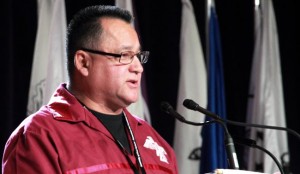With rights, come responsibilities

By Grand Council Chief Patrick Madahbee
Fishing, since time immemorial, has always been about respect, responsibility and discipline.
There has always been communal care for a fisher and his family. A recognized fisher is one who is held in high regard by their community. A fisher is known to maintain a self-imposed sacred oath to nature and its bounty. A fishing community take seriously their responsibility to monitor the stock, to promote sound health and safety practices, to uphold the right to fish in a manner that brings honour to both the fishers and community. Resource management is a collective right and not an individual right so efforts are needed to ensure a sustained resource.
It would seem that the precursor to harvest fish, whether inherently, by treaty right, or license is based on the premise that fish are plentiful. But are they? Are fish the only resource-exempt from the impacts of over-harvesting, climate change, pollution or invasive species? Is there some magical deep water reservoir that we are unaware of that continually restocks our fish just as quickly as our catch removes them? Sadly, our waters are in distress; its bounty of fish we rely on for sustenance is showing signs of crisis. They both warrant intervention.
Many active fishing communities have long relied on self-regulation to monitor and manage their fisheries. Nipissing First Nation, in 2006, took the remarkable next step by enacting a community supported Fisheries Law – a community-wide commitment to ensure that the fishery they have enjoyed since time immemorial is managed and monitored for sustainability; so that future generations too may benefit. They have become the model that other communities are striving towards to manage their fisheries as well. Times have changed. No longer is self-monitoring or self-regulation creating good healthy fish stock or a proud active fishing industry.
Whether you are a fisher in Lake Nipissing, Georgian Bay, Lake Huron, Lake Nipigon or other bodies of lakes and rivers – all evidence, both scientific and natural, combined with our traditional knowledge keepers advice, our active fishers, others acknowledge that our waterways and the resource held within her bounty are in crisis mode. Like a beloved family member in distress, it is our responsibility to find the intervention necessary to remedy the situation back to a healthy state. Nipissing First Nation is making the difficult and unpopular decision to call on actions that may be viewed as unfavorable to the fishing industry, to ensure that the lake stock enters a time of recovery.
The people of Nipissing First Nation must be commended for their leadership in calling for the industry to take pause, and we must all stand with them. Everyone must step up; it is our collective right and responsibility to do so.


